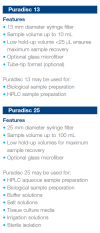Navigation
Install the app
How to install the app on iOS
Follow along with the video below to see how to install our site as a web app on your home screen.
Note: This feature may not be available in some browsers.
More options
Style variation
Guest viewing limit reached
- You have reached the maximum number of guest views allowed
- Please register below to remove this limitation
- Already a member? Click here to login
You are using an out of date browser. It may not display this or other websites correctly.
You should upgrade or use an alternative browser.
You should upgrade or use an alternative browser.
narta
Member
I am using PTFE Hydrophilic 0.2μm for the past years.
I brew for personal use only and don't use exotic solvents beside the standard BB and BB
I brew for personal use only and don't use exotic solvents beside the standard BB and BB
@Ridethelightningbarefoot I'd like to know about your thoughts/preference. Thank you!
AlistairASP
New Member
Thank you for your question. I also have the same question.
This is my current understanding.
Non-polar chemicals such as test e and oil: the hydrophobic filter is preferable.
A hydrophobic filter will retent moisture and allow your non-polar filtrates to pass the membrane layer.
Polar and water-soluble chemicals: the hydrophilic filter is preferable.
I will use a hydrophilic filter for glutathione and water-soluble vitamin for filtration.
What does happen if you use a hydrophilic filter with non-polar chemicals?
You might need to apply more pressure or driving force to let filtrate pass the membrane.
The highly hydrophobic chemical might be retained at the membrane interface and inner layer resulting in a lower concentration of some filtrate you want.
If anyone has a different understanding or suggestion, please let me know.
This is my current understanding.
Non-polar chemicals such as test e and oil: the hydrophobic filter is preferable.
A hydrophobic filter will retent moisture and allow your non-polar filtrates to pass the membrane layer.
Polar and water-soluble chemicals: the hydrophilic filter is preferable.
I will use a hydrophilic filter for glutathione and water-soluble vitamin for filtration.
What does happen if you use a hydrophilic filter with non-polar chemicals?
You might need to apply more pressure or driving force to let filtrate pass the membrane.
The highly hydrophobic chemical might be retained at the membrane interface and inner layer resulting in a lower concentration of some filtrate you want.
If anyone has a different understanding or suggestion, please let me know.
MixModz
New Member
Same. I never used 0,45um filter, it’s very dangerous with the infection. Especially if you used a small % of baI am using and was using far many litres among the years 0,22 hydrophilic PVDF or Nylon
Bought from ebay and locating was from China
Hydrophobic or hydrophilic. What do you prefer/suggest? Why?Same. I never used 0,45um filter, it’s very dangerous with the infection. Especially if you used a small % of ba
MixModz
New Member
Hydrophilic of course if you want to prep your own bacterio waterHydrophobic or hydrophilic. What do you prefer/suggest? Why?
And use large diameter of filter 33mm is good forget those 13mm
Ridethelightningbarefoot
Member
I'm not going to lie. Don't fully understand the difference between the two. I've mostly just concentrated on what type of membrane I'm using. Recently, I found a chart that says that benzel benzoate is only compatible with PTFE and nylon, so I switch to nylon filters. So unfortunately I don't really have much information about the hydrophobic and hydrophilic. I've never really seen it to make a difference. I've used PTFE filters before. I've never paid attention to the hydrophobic and hydrophilic and my gear has been okay so that's all I can really tell you.@Ridethelightningbarefoot I'd like to know about your thoughts/preference. Thank you!
What would you suggest for oils?Hydrophilic of course if you want to prep your own bacterio water
And use large diameter of filter 33mm is good forget those 13mm
Approx how much oil can be filtered with 47mm membrane?
Approx how much water with 47mm membrane?
Thank you for the reply
AlistairASP
New Member
What would you suggest for oils?
Approx how much oil can be filtered with 47mm membrane?
Approx how much water with 47mm membrane?
Thank you for the reply
Actually, there is no definite volume of the filtrate to the specific filter. It is depended on various factors that might be including:
- Impurity
- Chemical interaction between filtrate and membrane
- Durability of membrane
- transmembrane pressure
However, the Whatman filter gives some guideline for maximum volume as the following:
13mm syringe filter for 13ml
25mm syringe filter for 100ml
Please refer to the picture and the Whatman catalog for additional information.

The choice between hydrophilic and hydrophobic filters for filtering an oil solution depends on the nature of the solution and what you want to achieve. Here's a breakdown:
- Hydrophilic Filters:
- These filters attract water and are typically used to filter aqueous solutions or solutions with high water content.
- They repel oil and can become clogged if used with oil-based solutions.
- Hydrophilic filters are made of materials like cellulose acetate, nylon, or polyethersulfone.
- Hydrophobic Filters:
- These filters repel water and are suitable for filtering non-aqueous solutions, including oil-based solutions.
- They allow oil to pass through while blocking water or aqueous solutions.
- Hydrophobic filters are typically made from materials like polytetrafluoroethylene (PTFE) or polypropylene.
Similar threads
- Replies
- 4
- Views
- 178
- Replies
- 1
- Views
- 195
- Replies
- 56
- Views
- 1K
- Replies
- 2
- Views
- 300

